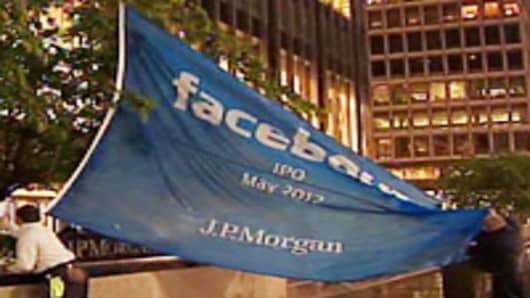The Facebook scandal du jour is the news that analysts at all three lead underwriters cut earnings estimates for the social network sometime during the road show.
The legal rules about selective disclosures leading up to an initial public offering are very murky. IPO road shows themselves are a form of selective disclosure, in which companies and underwriters make presentations that go beyond anything you’ll find in the public filings. But, of course, selective disclosures at road shows are permitted.
What’s more, the very nature of an IPO means that disclosures surrounding them can slip between the cracks of regulation. A company having an IPO is, almost by definition, not yet a public company and so the normal rules codified as Reg FD don’t apply.
And, of course, companies are allowed to disclose all sorts of information to their underwriters and attorneys that they don’t disclose to the broader public. The nature of the IPO process requires this kind of openness. But these legal and financial advisers are covered by confidentiality agreements that forbid them from passing on the information.
The general feeling evolving among financial writers is that while the mid-road show earnings forecast change looks very dodgy, it’s probably not a violation of securities laws.
Felix Salmon gives voice to the conventional wisdom here:
As Henry Blodget says, this whole episode stinks. It’s almost certainly not illegal. But if you look at the Finra rules about such things, it definitely violates the spirit of the law. For instance, the rules say that Morgan Stanley analysts weren’t allowed to show Facebook their research before it was published — but they don’t say that Facebook can’t quietly whisper in Morgan Stanley’s ear that its estimates might be a bit aggressive. Obviously, there’s no need for the analysts to give Facebook advance notice of their earnings downgrade if that earnings downgrade was a direct consequence of something Facebook told them.
I think this is going too far. While Facebook leaking information about earnings to analysts at the underwriters—if that’s what happened, something that so far we can only speculate about—might not violate Reg FD or Finra’s rules, another, older set of securities rules may have been breached.
Reg FD was passed in reaction to the Supreme Court decision’s in Dirks vs the SEC. In that case, the Supreme Court held that a corporate insider who discloses material nonpublic information to someone who trades on the stock of the insider’s company cannot be held liable for a 10b-5 insider trading violation unless the tipper benefited or expected to benefit from making the tip.
This made it much harder for the SEC to crack down on selective disclosure by companies to Wall Street analysts. Reg FD was put in place to give the SEC legal grounds to attack companies that make selective disclosures without showing intent to benefit.
But the old framework of insider trading rules still applies to selective disclosure. And this might be grounds for—at the very least—an SEC investigation into what may or may not have been disclosed to the analysts and the clients of the analysts.
Look at it this way. If someone at Facebook did whisper in the ear of the underwriters’ analysts about the earnings, and those analysts then used this material, non-public information for the basis of rethinking their estimates, and the clients of the banks then altered their orders for Facebook shares while in possession of this information, we have the makings of an insider trading case. The case would still turn on the tricky intent requirement, and so it might not go anywhere. But that’s an evidentiary matter and not a case of something being “certainly not illegal.”
It’s possible that the underwriters’ analysts never were tipped off about any non-public information. Maybe they just all came to the same conclusion based on changes in the publicly filed IPO materials.
But the only way to know for sure is for the SEC to investigate the matter.
Follow John on Twitter. (Market and financial news, adventures in New York City, plus whatever is on his mind.) You can email him at john.carney@nbcuni.com.
We also have two NetNet Twitter feeds. Follow CNBCnetnet for the best of the days posts, including breaking news. Follow NetNetDigest for a feed of every single post each day.
You can also be our friend on Facebook. Or subscribe to John's Facebook page.
We're on Google Plus too! Click here for John's Google+ page.
Questions? Comments? Tips? Email us atNetNet@cnbc.comor send a text message to: 917-740-8477.
Call us at 201-735-4638.



